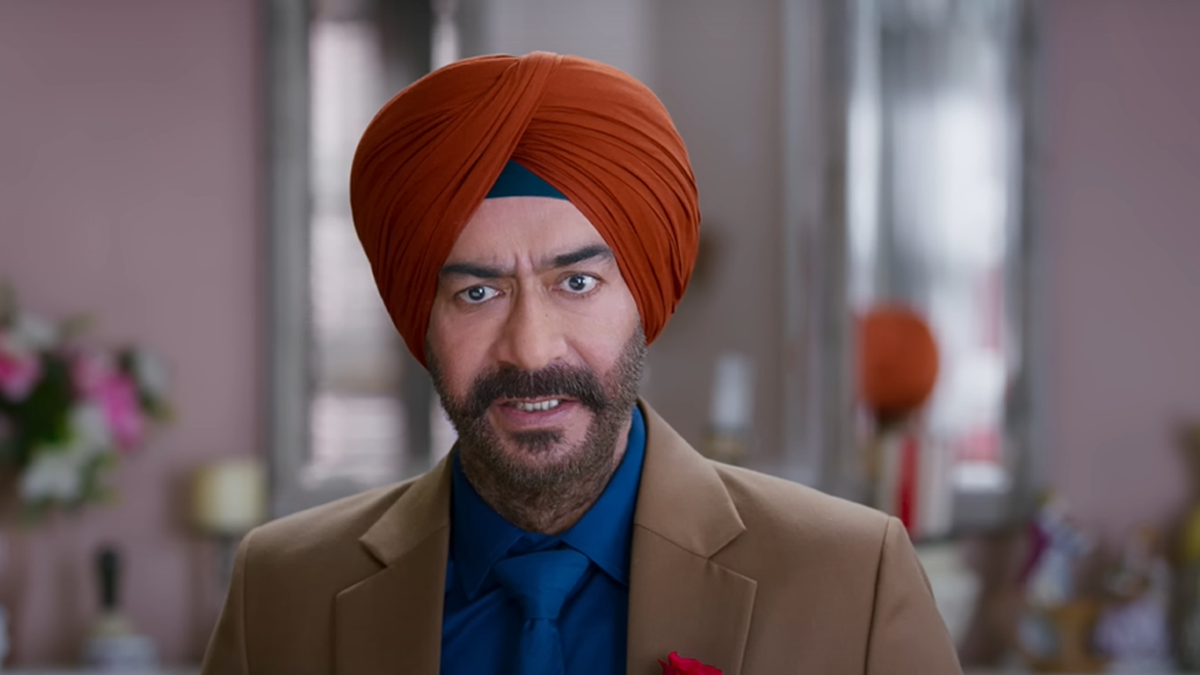 |
|
‘Son of Sardar 2’ attempts to build on the foundation laid by its predecessor, Ajay Devgn’s ode to his Punjabi heritage. However, the film quickly falls into the trap of relying heavily on tired Bollywood stereotypes associated with Sardars. The narrative leans into the caricature of the innocent, steadfast, and fearless Punjabi, a trope that feels increasingly dated in contemporary cinema. The constant repetition of the word “Punjabi” in the background score, punctuated by the incessant beating of dhols, feels less like a celebration of culture and more like a forced reminder of the film's setting and characters' identities. The storyline follows Jassi (Ajay Devgn), a simpleton who travels to London after a prolonged wait for a visa, only to discover that his wife, Dimple (Neeru Bajwa), has decided to leave him. Lost and heartbroken, Jassi finds an unexpected connection with Rabia (Mrunal Thakur), a Pakistani musician who leads a wedding band. This band includes the transgender musician Gul (Deepak Dobriyal) and Mehwish (Kubra Sait), along with Rabia’s foster daughter, Saba (Roshni Walia). Rabia herself is a woman scorned, having been abandoned by her philandering husband, Danish (Chunkey Panday). The plot thickens when Saba falls in love with the heir to the Sandhu family. Rabia, in a well-intentioned but ultimately misguided attempt to facilitate the relationship, convinces Jassi to impersonate Saba’s father. This sets in motion a chain of events fueled by endless and often politically incorrect gags. The Sandhu family is headed by Raja (Ravi Kishan), a character who embodies a deep-seated hatred for Pakistanis and a fervent admiration for Indian army men. This forces Jassi to adopt the persona of a colonel, channeling the iconic spirits of Sunny Deol in films like Border and Gadar. Director Vijay Kumar Arora attempts to weave in messages of cross-border harmony, subtly incorporating the sentiment of “long live the neighbor” into the script, particularly relevant in current times marked by strained relations. However, these attempts feel somewhat superficial, failing to meaningfully address the complexities of the situation or elevate the overall narrative beyond its reliance on comedic clichés. The film struggles to build upon its already chaotic plot, leaving the audience feeling adrift in a sea of predictable jokes and overused stereotypes.
The film's portrayal of women also warrants scrutiny. The narrative perpetuates the outdated notion of women as the custodians of family honor and national pride. The philandering Pakistani husband only experiences remorse when his wife and daughter are won over by Indians, reinforcing a problematic and patriarchal viewpoint. On the side of the antagonists, the family dynamic is rife with conflict. Sharat Saxena plays the rakish patriarch, Raja, who harbors resentment towards his father for favoring his English pole dancer wife over his Bihari mother. This subplot introduces a layer of class struggle to the comedic proceedings. Raja’s inability to speak either Punjabi or English fluently fuels his grumpiness and contributes to the film’s overall sense of social awkwardness. His character resorts to judging people based on their ‘breed’ in the livestock business, highlighting the film’s tendency to inject excessive social context into a supposedly lighthearted comedy. The casting of Ravi Kishan as the unlikely Sardar proves to be a stroke of genius. Brought in as a last-minute replacement for Sanjay Dutt, Kishan infuses the screen with an infectious and unrestrained energy. He finds his comedic rhythm in the company of Mukul Dev and Vindu Dara Singh, both of whom reprise their roles from the original film. Mukul Dev, in one of his final performances before his passing, leaves a lasting impression with his impeccable comic timing. However, the true star of the show is undoubtedly Deepak Dobriyal. His portrayal of Gul, the transgender musician, is nuanced and deeply affecting. He injects a sense of realism and depth into even the most absurd moments, finding method in the madness. Ajay Devgn, while maintaining a commendable physical presence, struggles to deliver comedic performances that feel natural. In the presence of Ravi Kishan and Deepak Dobriyal, his comedic timing appears somewhat forced and exaggerated. Mrunal Thakur, a talented actress in her own right, gives her all to the role, perhaps viewing it as a vehicle to reach a wider audience through mainstream entertainment.
Despite the presence of strong performances from certain members of the cast, the film suffers from inconsistencies in its comedic delivery. While some jokes manage to land effectively, there are prolonged stretches that elicit cringes and cause viewers to question their own judgment in choosing to watch the film. The pacing is uneven, with moments of hilarity interspersed with lengthy periods of awkwardness and repetition. The film's reliance on stereotypes, particularly those related to ethnicity and gender, ultimately undermines its comedic potential. The attempts to incorporate social commentary feel forced and often detract from the intended humor. The convoluted plot, filled with unnecessary subplots and predictable twists, further contributes to the film's overall sense of disarray. The direction lacks a cohesive vision, resulting in a film that feels disjointed and lacking in focus. The music, while incorporating traditional Punjabi elements, becomes repetitive and grating over time. The editing is uneven, with scenes that drag on for too long and transitions that feel abrupt. The overall experience of watching ‘Son of Sardar 2’ is akin to riding a rollercoaster. There are moments of genuine amusement, followed by plunges into periods of boredom and discomfort. The film’s attempt to blend comedy with social commentary ultimately falls flat, resulting in a product that feels both superficial and insensitive. After two installments, one can only hope that the filmmakers have finally exhausted the comedic possibilities of the Sardar family, allowing the franchise to rest in peace.
